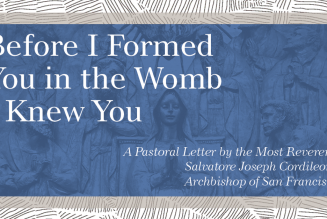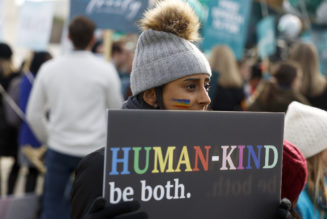 Question: Does the Church allow for transgender surgery in the case of a baby born with both male and female organs (hermaphrodite) or in the case of a botched circumcision?
Question: Does the Church allow for transgender surgery in the case of a baby born with both male and female organs (hermaphrodite) or in the case of a botched circumcision?
— Anne Bovee, Philadelphia
Answer: The situations that you describe are very rare. As such, they are a bit of an anomaly or outlier, not easily covered by general bioethical norms.
A hermaphrodite is a child born with a sex that is not easily determined by looking at the genitals. At times, the child may seem to have both genitalia or parts of both. Usually a genetic analysis of their cells can indicate the true sex of the infant. In such cases as these, surgical repairs to the genitals to indicate the true sex of the infant is licit and not forbidden by the Church. However, there are some even rarer cases where genetic analysis does not provide a clear answer as to the sex of the child. This is due to chromosomal and genetic irregularities. In such cases as these, the parents are permitted to make a difficult decision to determine the sex of the child and permit necessary surgeries to the genitals to reflect that determination. Some parents choose to wait some time to observe the child and his or her tendencies before making that decision.
Such permitted surgeries are not properly termed “transgender surgery” since they are not intending to change the sex of a person. In truth, there is no such thing as “transgender surgery.” Surgery cannot alter the true sex of a person. Transgenderism is based on a lie that one’s sex (sometimes called gender) can be changed. It cannot. No, there is not a broad spectrum of “genders.” Scripture is clear that we come in one of two sexes: “God created mankind in his image; in the image of God he created them; male and female he created them” (Gn 1:27). Since Scripture is truth, what contradicts it is untrue.
Even more rare are botched circumcisions. However, in this case it is not permitted to proceed with surgeries that attempt to alter the sex of the child. As noted, no amount of surgery can alter the sex of a child; a boy cannot become a girl. There are some boys and men who, for various reasons, are missing some or all of their genitals. This does not make them female. They are still male, even though some of their masculine aspects are missing or damaged.
Priestly titles
Question: Could you explain the differences between addressing one as father or monsignor? Also what do the letters after a priest’s name mean?
— Cathy Ramsey, via email
Answer: The title “Monsignor” is honorific and does not indicate that such a priest has authority or rank over other priests. The title, while conferred by the pope, is given by request of a bishop who wishes to honor a priest who has been especially helpful or who holds a high office in the diocese such as vicar general, dean or seminary rector. Most Catholics in America call their priests “Father” or “Monsignor” as the case may be. It is certainly not required to call a priest who has the monsignorial title “Monsignor,” but it is customary. There are actually three “types” of monsignor: Chaplains to His Holiness, Prelate of Honor, and Protonotary Apostolic. Today, monsignors are almost always designated as Chaplains to His Holiness, and they have purple piping and buttons on their cassocks. Prelates of honor are rarer today and have red piping and buttons on their cassocks. Protonotary Apostolic is quite rare and largely reserved for Roman officials or high ranking diocesan officials. Some years back Pope Francis limited the naming of monsignors to priests who are 65 or older. And this makes the title even more rare today. A future pope may reverse this, however.
Other titles and initials of priests usually indicate something of their function in a diocese. The title “Very Reverend” is given to a priest who represents the bishop in some way, such as chancery officials and deans. Initials are also used: V.G. for Vicar General (the priest who runs the chancery), V.F. for Vicar Forane (priests who are deans overseeing a group of parishes in an area), J.C.D. for a priest who is a canon lawyer, S.T.D. for a priest who has a doctorate in Sacred Theology, and M.A. or M.DIV. for priests who have a Masters degree or Master of Divinity Degree.
Msgr. Charles Pope is the pastor of Holy Comforter-St. Cyprian in Washington, D.C., and writes for the Archdiocese of Washington, D.C. at blog.adw.org. Send questions to msgrpope@osv.com.
Join Our Telegram Group : Salvation & Prosperity










